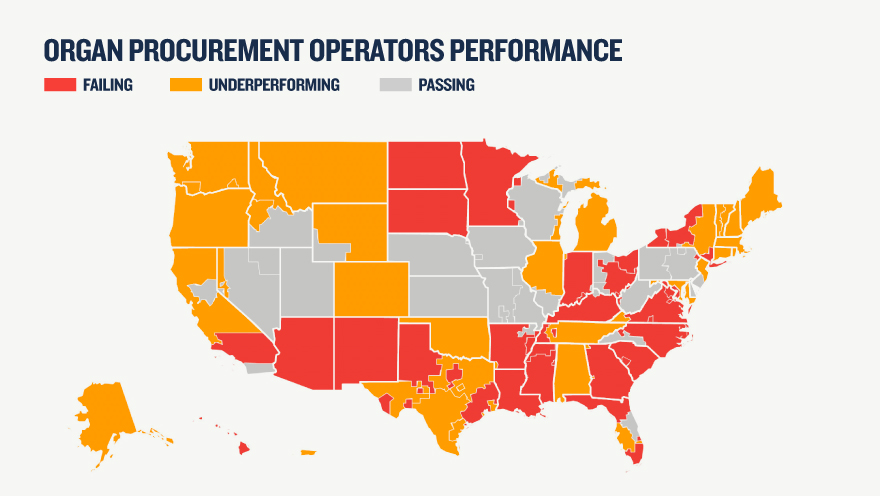Improving Organ Donation to Save Thousands of Lives

The mismanagement and failures of local organ procurement organizations (OPOs), as well as UNOS — the contractor that manages the national organ transplant system — result in preventable deaths every day. These failures also drive $36 billion per year in Medicare spending for patients on dialysis as they await kidney transplants, representing a full 1% of the entire federal budget. Reforming this system and using data to hold organizations accountable for the first time introduces competition and accountability into an incompetent monopolistic system — and saves lives.
Who We’re Supporting
The Organs Initiative, launched by two nonprofits working together — the Federation of American Scientists and Organize — has driven bipartisan reforms in our national organ donation system. By leveraging data to highlight system failings, increase transparency, and enable the federal government to hold organ contractors accountable for the first time, this work aims to ensure a more effective national system of organ donation on a permanent basis.
In 2022, the group helped to ensure that new data-driven, legally enforceable standards for OPOs went into effect. This critical first step was the capstone to a decades-long fight to hold local organ contractors accountable. Since that time, bipartisan Congressional leaders have escalated investigations into systemic waste, fraud, and abuse among federal organ contractors, as well as called for increased transparency in any effort to ensure evidence of effective organ donation services across the country.
The larger goal of the Organs Initiative is to save lives, replacing the current monopolistic structure with a competitive ecosystem in which the performance incentives for organ contractors are more closely aligned with the interests of patients — and in which failing contractors can be readily replaced by higher performers.
Why It Matters
According to a bipartisan report from the Senate Finance Committee, “the U.S. transplant network is not working, putting Americans’ lives at risk.” In 2023, approximately 103,000 people were on the organ waiting list. The Washington Post detailed that UNOS uses “out-of-date technology that has crashed for hours at a time” and has also been responsible for the “careless treatment of donated organs [and] organs lost in transit.” The failures of existing federal organ contractors — funded by the American taxpayer — have meant that thousands of Americans die each year waiting for organs.
The Organs Initiative utilizes a proven, data-driven approach to inject competition and accountability into the system of federal organ donation contractors — all with the goal of saving patients’ lives.
What’s the Impact
The data-driven organ donation policy which went into effect in 2022 is projected to save over 7,000 lives per year and $1 billion per year for the American taxpayer. The legislation unanimously passed in July 2023 lays the groundwork to break up the national organ monopoly which Forbes has described as a “cartel” and will translate to much greater care being provided for generous American donor families and the transplant patients who rely on them. This represents a transformational change in the decades-long fight to hold federal contractors accountable and prevent unnecessary American deaths on the organ waiting list.

Read more from The Washington Post: Congress authorizes overhaul of troubled organ transplant system.
